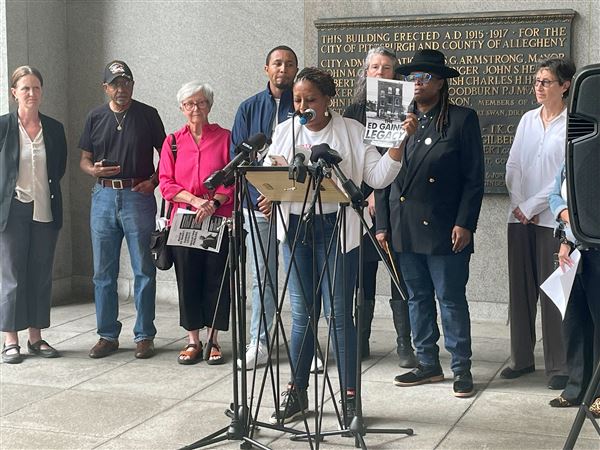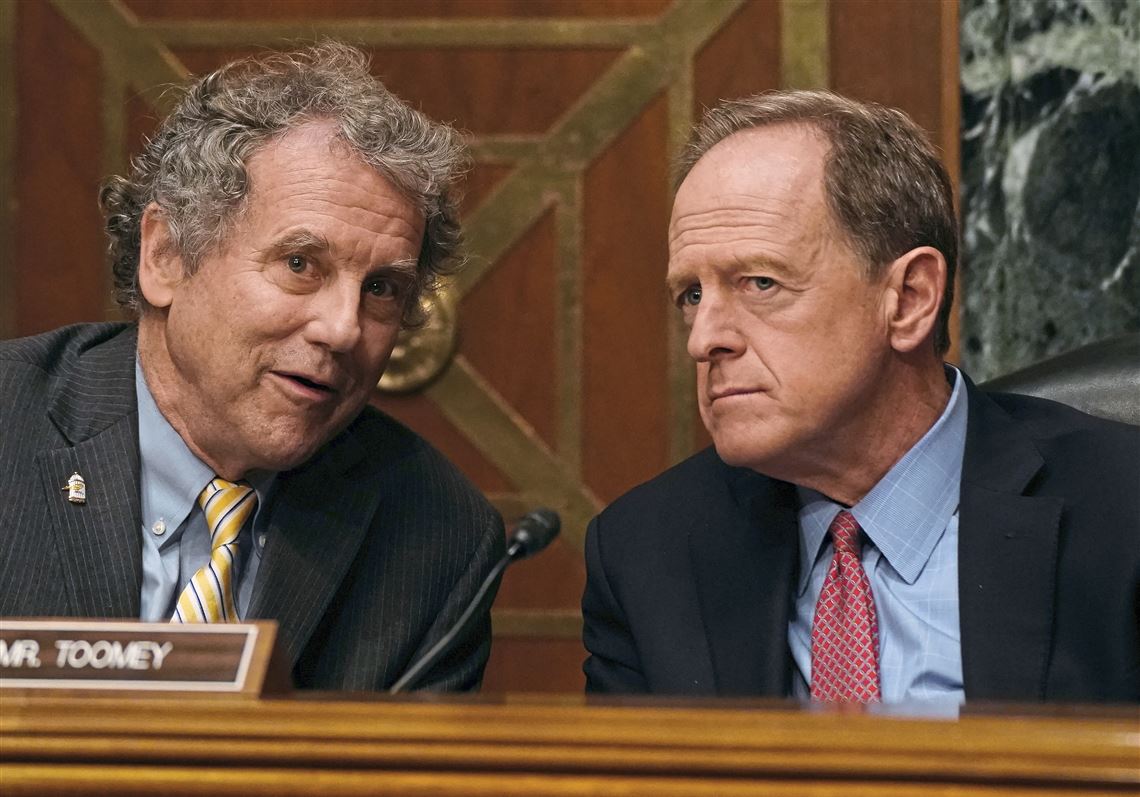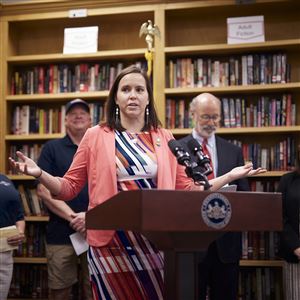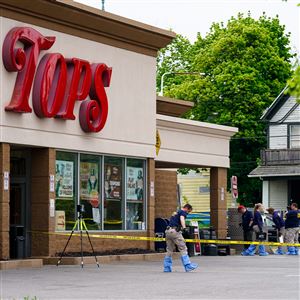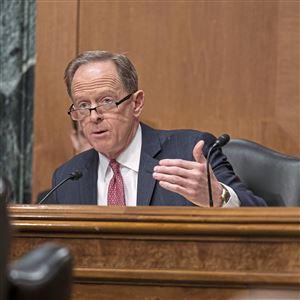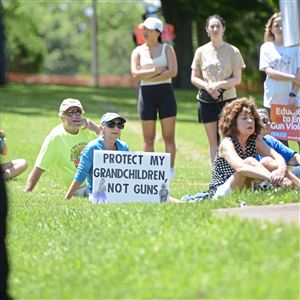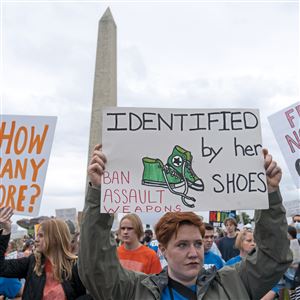WASHINGTON — A group of senators, including a key bloc of Republicans — among them Pennsylvania’s Pat Toomey — put forward a “commonsense, bipartisan” deal on gun reform Sunday amid a nationwide surge in high-profile mass shootings.
The deal announced Sunday afternoon would support so-called red flag laws, fund mental health initiatives, flag domestic violence perpetrators in the national background check system, and expand the review process for weapons buyers under 21.
Though the proposal neither includes the wide-ranging measures passed along party lines in the House last week nor President Joe Biden’s call for an assault weapons ban, the legislation could mark the first significant movement on gun laws since the mid-1990s.
In a tweet published Sunday night, Mr. Toomey described the bill as protecting “the Second Amendment rights of law-abiding Americans while making our communities safer.”
We can protect the Second Amendment rights of law-abiding Americans while making our communities safer. This bipartisan agreement offers a path forward to achieving that.
— Senator Pat Toomey (@SenToomey) June 12, 2022
https://t.co/qrfmIb1UIm
Twenty senators also released a joint statement on the bill earlier Sunday: “Families are scared, and it is our duty to come together and get something done that will help restore their sense of safety and security in their communities,” the statement read.
“Our plan increases needed mental health resources, improves school safety and support for students, and helps ensure [that] dangerous criminals and those who are adjudicated as mentally ill can’t purchase weapons. ... We look forward to earning broad, bipartisan support and passing our commonsense proposal into law.”
The framework includes nine areas broadly outlined as investment in mental health trauma, including family, telehealth and school-based programs; funding for school safety; reviews of juvenile and mental health records for buyers under 21, including checks into state and local law enforcement databases; and clarification and penalties surrounding licensing and illegal trafficking.
The proposal also includes measures aimed at adding convicted domestic abusers and those with restraining orders into the National Instant Criminal Background Check System. It also sends resources for states to establish or enforce existing laws that would temporarily seize firearms from those who pose a risk to themselves or others, also called red-flag or extreme-risk laws.
The deal, which has been under negotiation since late May when an 18-year-old fatally shot 19 schoolchildren and two teachers at a Texas elementary school, will need unified support from the Democrats and at least 10 Republicans to clear the upper chamber’s 60-vote filibuster hurdle.
Mr. Toomey, who with Sen. Joe Manchin, D-W.Va. has supported expanding background checks since the 2012 Sandy Hook massacre, was among the negotiators and is joined by nine from his party in supporting the deal. The senators include Republican negotiation leader John Cornyn, of Texas; Roy Blunt, of Missouri; Richard Burr, of North Carolina; Bill Cassidy, of Louisiana; Susan Collins, of Maine; Lindsey Graham, of South Carolina; Rob Portman, of Ohio; and Mitt Romney, of Utah.
Sen. Chris Murphy, who represents Connecticut and led negotiations for the Democratic side, called the deal a “breakthrough” Sunday on Twitter — “the first in 30 years — that will save lives.”
“Drafting this law and passing it through both chambers will not be easy. We have a long way before this gets to the President’s desk. But with your help and activism, we can get this done. This time, failure cannot be an option,” he wrote.
Others supporting the framework include Mr. Manchin and Sens. Kyrsten Sinema, D-Ariz.; Richard Blumenthal, D-Conn.; Chris Coons, D-Del.; Mark Kelly, D-Ariz.; Angus King, I-Maine; and Debbie Stabenow, D-Mich.
The proposal comes nearly a month after 10 Black shoppers were shot and killed at a supermarket in Buffalo, N.Y. A grand jury has indicted an 18-year-old alleged gunman, and the case is being investigated as a racially motivated hate crime.
It also comes one day after thousands attended pro-gun-control rallies across the country organized by the student-led March for Our Lives group, including a Washington event on the National Mall and a Pittsburgh event in Oakland.
Mr. Biden thanked the senators in a statement Sunday.
“Obviously, it does not do everything that I think is needed, but it reflects important steps in the right direction, and would be the most significant gun safety legislation to pass Congress in decades,” Mr. Biden said.
“With bipartisan support, there are no excuses for delay, and no reason why it should not quickly move through the Senate and the House. Each day that passes, more children are killed in this country: the sooner it comes to my desk, the sooner I can sign it, and the sooner we can use these measures to save lives.”
Pennsylvania Lt. Gov. John Fetterman, a Democrat who is vying for the retiring Mr. Toomey’s seat in November, released a statement via Twitter saying that he would “proudly” vote for the bill if he were a member of the legislative body.
“Will the bipartisan gun violence bill do everything we need? No. But I believe it’s real progress that will save lives,” he wrote.
The campaign of the celebrity heart surgeon and Republican Senate candidate Mehmet Oz did not respond for comment.
Senate Majority Leader Chuck Schumer, D-N.Y., called the deal “a good first step to ending the persistent inaction to the gun violence epidemic.”
“Once the text of this agreement is finalized, I will put this bill on the floor as soon as possible so that the Senate can act quickly to advance gun-safety legislation,” he said in a statement.
The National Rifle Association, the largest gun owners advocacy organization in the U.S., wrote on Twitter that as a policy it does not take positions on proposed frameworks but that it does support “real solutions to help stop violence in our communities.”
“We will make our position known when the full text of the bill is available for review,” the organization wrote.
The organization also wrote on the social media platform that it will “continue to oppose any effort to insert gun control policies, initiatives that override constitutional due process protections, [and] efforts to deprive law-abiding citizens of their fundamental right to protect themselves/loved ones into this or any other legislation.”
Statements of support were voiced by the American Medical Association and gun-control advocacy groups, including CeaseFirePA.
Josh Fleitman, Western Pennsylvania manager for the organization, called the proposal an “important first step.”
“While the announced framework is not enough to comprehensively address the gun violence crisis in America, we urge the U.S. Senate to pass this package and take further action,” he said in statement.
Sen. Bob Casey, D-Pa., wrote on social media that he was “encouraged” by the deal.
“While we need to do more to close loopholes and keep weapons of war off our streets, this deal is an important first step,” he said.
Mr. Casey senator published an op-ed in The Washington Post on Wednesday explaining his evolution on supporting gun regulations after a 20-year-old gunman killed 20 6- and 7-year-olds and six educators at Sandy Hook Elementary School in Newtown, Conn.
“I came to Washington in 2007 with the firm belief that to support and honor Pennsylvania’s deep-rooted hunting culture meant that I should not support restrictions on gun sales or increased regulations,” he wrote. “Then, in 2012, Sandy Hook happened.”
Ashley Murray: amurray@post-gazette.com
First Published: June 12, 2022, 4:05 p.m.
Updated: June 12, 2022, 5:13 p.m.



